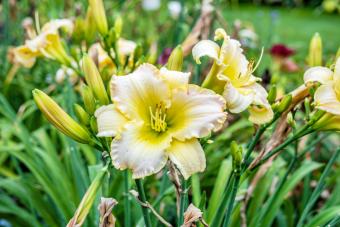
With the cost-of-living crisis and houses with sizable yards practically impossible to afford, young adults have turned to transforming their spaces into plant oases. And when you go over to a proud plant parent’s house, they want nothing more than to gift you a starter infant to make your own plant family.
Whether you’re the proud plant parent or an intrepid plant lover, you want to surround yourself and others with plants that have meanings beyond their looks. If you love hidden messages, this collection of houseplants and their varied meanings are perfect for you to gift to yourself or others.
Parlor Palm: Good Fortune & Prosperity

Nicknamed the parlor palm, chamaedorea elegans was a massively popular tropical palm plant in the Victorian period. They brightened up Victorian parlors, giving them their common name. Today, these tall houseplants aren’t as common as they once were, but everyone could do with a little parlor palm energy in their home.
Historically, parlor palms were said to represent prosperity and good fortune. If you’re going through a rough patch, let a parlor palm clean the air — metaphorically and physically.
Philodendron: Love & Emotional Healing

Philodendron is a charming squat foliage plant that’s most loved for its heart-shaped leaves. Naturally, this leaf motif hints at its deeper meaning. Traditionally, these perennial plants have represented love and emotional healing. If a friend is going through a breakup, pick out one of the hundreds of philodendron varieties to help boost their spirit.
Calathea: New Beginnings

Calathea, with its striped, striking leaves, is a mainstay of the modern houseplant parent community. They’re great if you’ve got a chunk of empty space and want to fill it with something without cluttering up the room.
Calatheas have a strong tradition as a housewarming gift, because they symbolize new beginnings. So, if you’ve got some weddings, graduations, or births in your future, stock up on some calathea plants.
English Ivy: Friendship & Fidelity

Ivy is one of those rare plants that has deep roots in the ancient world. In the United Kingdom, English ivy was a popular garden and houseplant. Intertwining itself with whatever it grows around, you can see why the winding symbolized friendship and fidelity.
If you’ve got a big Friendsgiving or Galentine's Day event coming up, consider getting everyone a small English ivy plant to take home. Instead of something permanent like a friendship tattoo, get an English ivy instead.
Kentia Palm: Eternal Life

Another large palm with a hidden meaning is the kentia palm. When grown indoors, these palms can reach human heights with large, draping fronds. It’s no wonder they’ve been a beloved ornamental plant for so long.
Kentia palms symbolize eternal life. And while we haven’t cracked the code or stumbled across the fountain of youth, we could all do with a little resilient energy. Remind everyone around you that they’ve still got time to cross everything off of their bucket list by giving them a kentia plant.
Staghorn Fern: Pride & Persistence

The staghorn fern is one of those plants that looks like it was created for a fantasy film. Instead of the typical fern leaf structure, staghorn ferns grow leaves that resemble the shape of a deer’s antlers. A proud prey creature, it’s this animal connection that inspired the plant’s common meaning.
If you’re really proud of an accomplishment, consider running to the nursery and picking up a staghorn fern to commemorate it. These plants symbolize pride and persistence. And having that reminder to look at every day will encourage you to keep moving forward.
Prayer Plant: Gratitude

If you imagine walking through the dense landscape of the Amazon or Congo Rainforest, you probably conjure up foliage that looks like prayer plants. These relatively small houseplants have very shiny, thick, and saturated leaves with red/pink striations. But you shouldn’t keep a running tab of them at the nursery because of their striking design.
Rather, you should keep some prayer plants on hand to give to people as a thank you. These plants symbolize gratitude, and, unlike some plants, it’s not hard work to care for them.
Chinese Money Plant: Prosperity & Luck

If you want to boost your finances and maybe increase your chances at winning the lottery, get yourself a Chinese money plant. With coin-shaped leaves, money plants have been said to represent wealth and luck for generations. And with the dire straits the world is currently in on the financial front, we could all do with a little luck and good fortune in our futures.
Sign up for our newsletter featuring all the latest stories and products we love.
Jasmine: Maternal Respect & Affection

You might be more likely to find Jasmine, with its delicate (often white) petals and heady aroma, in perfume scents than you are to see someone growing them at home. Once a popular household plant, jasmine deserves a comeback, and why not let it be on Mother’s Day?
In Thailand, it’s customary to gift jasmine plants on Mother’s Day and to the maternal figures in your life as a sign of respect and love.
Hyacinth: Apology

Hyacinth is one of those plants that most people grow outside, but you can bring small batches indoors and watch the colorful petals grow. We’d be remiss if we didn’t mention at least one flower from the Victorian flower language on this list.
Hyacinths in the 19th century were sent as apology flowers. So, avoid the back and forth and stubborn posturing and instead, send someone a hyacinth to say you’re sorry.
Houseplant Symbolism Makes Buying Plants More Fun

Of course, when you’re picking up a new plant baby, you look at the growing conditions, how large they can get, how much sunlight they need, and so on. But the perfunctory stuff can get a little boring. Add some excitement to your nursery shopping adventures by learning about the different plants and their meanings.







